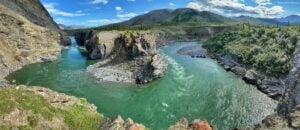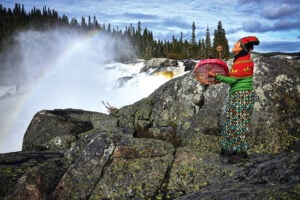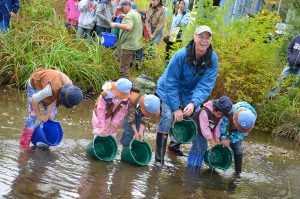
Travel
Rafting the Firth River with Nahanni River Adventures
Brian and Dee Keating share their incredible rafting journey in the remote Arctic tundra on a once-in-a-lifetime Canadian Geographic Adventure
- 4617 words
- 19 minutes
Travel
The ultimate rainforest retreat complete with eco-adventures, hands-on education and adrenaline-inducing activities amidst tropical jungle scenery

During a brief respite from the late-season showers, Roberto Gallo guides my 10-year-old daughter to a dugout hole on a muddy hill. He hands her the sapling of a mountain almond tree, shows her a plot, and demonstrates how to sturdy the vulnerable plant with fertile dirt. Around us, more than 100 American and Canadian junior college students have just finished planting 1,500 trees, offsetting the carbon of their three-month conservation studies in Costa Rica. Previous classes planted trees on an adjacent hill, and I can see the farmland gradually transform into the lush tropical forest that will one day attract wildlife, birds, and adventurous tourists. This legacy of Roberto’s acclaimed father, the late Rafa Gallo, creates a strong generational bond to passionately protect, promote, and advocate for Costa Rica’s pristine wilderness. Over an action-packed week immersed in the endless wonders of the jungle, I saw my legacy gradually evolve, too.

Rafa Gallo was a legend in the world of white-water rafting. Since founding his rafting company and the former Rios Tropicales Lodge on the shores of the Pacuare River – a dense jungle located about four hours’ drive from the Costa Rican capital of San Jose – Rafa worked tirelessly to steward the region’s remarkable biodiversity, increase opportunities for the community, and introduce elite and first-time paddlers to the wonders of his beloved Pacuare. Rafa embraced conservation and tree-planting decades before it became de rigueur, expanding his lodge and using profits from Costa Rica’s eco-tourism boom to buy up nearly 2500 acres of farmland, restoring it into the region’s largest privately protected reserve.
Having built a sustainable local tourism industry and planted tens of thousands of trees, Rafa picked up a raft load of awards, including National Geographic’s Best Travel Adventure Company on Earth and an award from the International Conference on Sustainable Tourism for his efforts to transform former Colombian guerilla fighters into world-class rafting guides. Admired by peers for his positive energy and enthusiasm, Rafa founded and was Honorary President of the International Rafting Federation and he was inducted into the Whitewater Hall of Fame. His untimely death in 2021 after a 14-month battle with cancer was mourned by the international rafting community. Shortly before his passing, Rios Tropicales could no longer afford to operate as the pandemic ravaged tourism in Costa Rica. Yet, you can’t keep a good man, his inflatable raft or his legacy down.


Rafa’s 28-year-old son Roberto and several international partners have relaunched, rebranded, and redeveloped the concept of Rafa’s eco-lodge. Honouring his memory, Rios Lodge has a renewed focus on conservation and land protection, inviting guests to stay longer, do more, and learn much along the way. The adventure starts before you get there. After an early morning pick-up to navigate the heaving traffic of San Jose, a shuttle bus deposits us at a river bank for the most convenient way to get to the lodge: raft the clear waters of the Pacuare itself.

Slipping into bathing suits and our luggage into dry bags, an hour-long descent across grade one to three rapids to reach Rios Lodge awaits us. No road access exists, although guests and staff can also hike through the jungle. Departures from the lodge take on more challenging grade four to five rapids, which is why guests under 12 years old leave on foot. Everything from building supplies and appliances to meals and furniture floats in by raft, a fitting form of transportation for a sustainable eco-lodge that generates hydroelectric and solar power and has unlimited clean water. We’re floating into the rapids within seconds, and my daughter screams delightfully. In Costa Rica, the common expression is ‘pura vida!’ which roughly translates as “this is living!” Our experienced and supremely knowledgeable guide, Jorge Calderòn, just smiles as if to say: “Honey, just wait what we have in store.”
Roberto Gallo was paddling with his father on the Pacuare before he could walk. Before a fresh breakfast of tropical fruit and made-to-order eggs this morning, he takes us into the trees. Rios Lodge installed eight thrilling ziplines across the river, part of a push to add more activities for guests to stay longer. Roberto hoists my daughter onto a 280-metre-long line, and she fearlessly takes off with a high-pitched howl of approval. Showing no fear, I’m immensely proud of her spirited attitude. Jorge is delighted with her curiosity for the large spiders, tiny frogs, the soaring jungle vines, and the crackling jungle birds. He shows her the industrious leaf ants carrying their loads and the terrifying bullet ants with the worst sting in the insect kingdom. A born teacher with a wry sense of humour, Jorge demonstrates how hydroponic plants repel water, how flowers trick insects to assist with pollination, and how bats shelter beneath their leafy tents. My daughter is endlessly fascinated with this hands-on biology field trip. Still, she’s up for the action, from tubing down the river to scrambling up a beautiful canyon dotted with endless emerald pools.
Surrounded by impenetrable forest, the sticky jungle is remote and seemingly hostile. On a night safari that yields glass frogs and assorted bugs, we turn off our flashlights to find the darkness overwhelming. My daughter prefers stacking rocks and drawing with river clay at the lodge’s infinity pool – a natural swimming hole at the base of a surging waterfall. Jorge reminds my daughter to leave everything as she found it to be enjoyed by the next human lucky enough to follow in her footsteps.

We hike out one morning to take a human-powered eco-tram across the Pacuare River, spotting exotic tiger herons, poison-dart frogs, and keel-billed toucans along the way. Roberto invites lodge guests on three-night packages to plant trees on a conservation tour, but today is a special occasion. The Rivers and Forests Alliance, a non-profit organization inspired by Rafa Gallo (with the fitting abbreviation of RAFA), has partnered with VERTO, a study abroad program, to tackle student carbon emissions. “We’re offsetting three tons of carbon today,” explains Roberto. I chatted to some bubbly students, emphatic that this experience has forever changed their lives. Rafa would be so proud of his son. Parents who support their bug-bitten kids to study conservation in Central America in exchange for college credits should be proud of their kids, too.
After four nights of eco-education and bucket list adventure, Jorge guides us out of the jungle. We cross a suspension bridge, hike up a steep hill, and then hop onto a pony for an hour-long ride along the bumpy farming roads. Along the way, we ate wild guava and caught a wolf spider vs. pepsis wasp deathmatch (the wasp won). Although she moaned a bit in the sticky jungle heat, my daughter beamed from ear to ear riding her pony and struggled to come up with her top five experiences of the week.
“Not every kid is so excited for all this stuff,” observes Jorge, but I suppose not every kid is the daughter of a globe-trotting travel writer. Every parent leaves their legacy, whether protecting jungle ecosystems, travelling to unusual places, or supporting their kids in whatever endeavour they choose. Benjamin Disraeli captured it perfectly: “The legacy of heroes is the memory of a great name and the inheritance of a great example.” Those with the good fortune to visit Rios Lodge on the Pacuare River will see this statement come alive.


Are you passionate about Canadian geography?
You can support Canadian Geographic in 3 ways:

Travel
Brian and Dee Keating share their incredible rafting journey in the remote Arctic tundra on a once-in-a-lifetime Canadian Geographic Adventure

Environment
In February 2021, the world was introduced to Mutehekau Shipu — also known as the Magpie River — when the people of Ekuanitshit, Que. and the regional municipality made a joint declaration granting the river legal personhood and rights. The declaration carries broad implications for the fight to protect nature across Canada and around the world.

Travel
Great guides! An amazing cadre of learned and enthusiastic guides ensures travellers to Costa Rica get the most out of this paradise

Environment
Mark Angelo, founder of BC Rivers Day and World Rivers Day, shares insights on his love of rivers, his forthcoming film and what can be done to protect the planet’s waterways